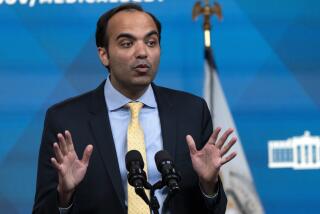3 Credit Bureaus to Pay $2.5 Million to Settle U.S. Suit
- Share via
The nation’s three leading credit bureaus agreed Thursday to pay $2.5 million in fines and to adopt higher customer-service standards to settle a federal lawsuit accusing them of failing to respond to phone inquires from consumers and leaving some callers on hold for as long as an hour.
The agreement brings a quick conclusion to a complaint filed Thursday by the Federal Trade Commission against Experian Inc., Trans Union and Equifax Inc., which were charged with violating the Fair Credit Reporting Act.
In 1997, the federal law was amended to require that credit bureaus maintain toll-free phone hotlines, publish their phone numbers on credit reports and provide consumers with access to live personnel during normal business hours.
Though all three credit bureaus have long maintained toll-free hotlines, an 18-month investigation by the FTC found that millions of consumers were receiving busy signals, taped messages advising them to call back or long waits on hold.
“Too many people were getting busy signals,” said David Medine, FTC associate director for financial practices. “There was a lot of consumer frustration.”
The FTC logged thousands of complaints about the problem. At one credit bureau, as many as 70% of all calls went unanswered during some periods and hold times exceeded an hour, FTC officials said. Regulators declined to identify problems at specific credit bureaus.
Medine noted that the delays were particularly harmful to mortgage or auto loan applicants who had questions about their credit reports or needed to correct errors quickly.
Under the terms of the settlement, the credit bureaus agreed to answer at least 90% of all consumer calls and keep average hold times to 3 1/2 minutes or less. The companies did not admit any wrongdoing.
Officials at Orange-based Experian, Atlanta-based Equifax and Chicago-based Trans Union said they have already taken steps to improve customer service, increasing staff levels and investing in new equipment to handle more consumer calls.
“Consumers are getting through,” said Alan Boyer, spokesman for Equifax. “Today, we are already outperforming the new standard.” He said Equifax currently answers 99.9% of its incoming calls, with an average hold time of less than two minutes.
Officials at Experian, which receives about 1 million consumer calls a month, said the company was caught off guard in late 1997 by the sudden spike in consumer calls, spurred by changes to the Fair Credit Reporting Act and increased attention to the toll-free hotlines.
“We were handling more calls than ever before,” said Maxine Sweet, vice president of consumer affairs for Experian. “But we recognized the problem and already meet the new standards.”
Under the settlement, Experian and Trans Union agreed to pay $1 million each. Equifax will pay $500,000.
Trans Union and Equifax also agreed to stop blocking consumer calls from certain geographic areas. FTC officials said the two companies had blocked calls from certain area codes because they believed those inquiries should have been handled by affiliated credit bureaus.
All three credit bureaus also agreed to monitor their compliance with the new standards and report the results to the FTC every six months, Medine said.
More to Read
Inside the business of entertainment
The Wide Shot brings you news, analysis and insights on everything from streaming wars to production — and what it all means for the future.
You may occasionally receive promotional content from the Los Angeles Times.










